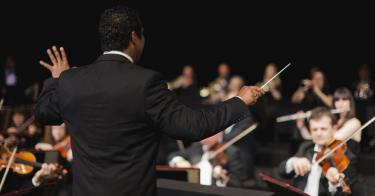Gustav Mahler, one of the foremost composers and conductors of the Romantic Era, famously said that “tradition is not the worship of ashes, but the preservation of fire.” Those words have resonated with musicians ever since, inspiring them to cultivate a style of performance called Historically Informed Performance (HIP) to keep modern musicians as faithful to old music as possible.
HIP is used in a variety of ways in a performance setting. One is the use of period-specific instruments that were played around the time and region in which a piece was composed, like using a harpsichord to navigate the basso continuo of Vivaldi’s The Four Seasons (1723) instead of a modern piano. Another is more subtle: the use of different articulations and phrasing to better reflect the performative style more common in an earlier era. After all, a staccato quarter-note by Franz Schubert in 1828 shares very few similarities with a staccato quarter-note by Arnold Schoenberg in 1943. But the many methods of HIP all aim to achieve the same effect: to understand and perform compositions as they were originally understood and heard.
Musicians adhere to HIP because they recognize the intrinsic value in upholding the original creative meaning of a composer, regardless of how times have changed since the composition. Despite changes in technology, culture, and social norms, original meaning matters. In this respect, musicians are practicing musical originalism.
>>> Originalism Keeps Judges in Check and the People in Charge
The Supreme Court—an institution that has lately raised the ire of many social progressives in the performing arts—is criticized for its use of originalism, in which the Court interprets laws with an eye toward how the words and phrases were understood at the time they were written. But critics of this interpretive approach might better understand it when they consider that classical music ensembles operate on a strikingly similar foundation.
When Tchaikovsky wrote the now-famous Romeo and Juliet for symphony orchestra, he had in mind a specific sound and sense of the work. He imagined it performed with instruments he knew. He imagined those instruments played with techniques he knew. And he imagined those techniques employed with a performative flair that he knew. The work he created encompassed all of that.
Perhaps Tchaikovsky imagined that others would change his music in the future, but if others did so, the music would no longer be what he intended it to be. Professional musicians know this well, and so they work hard to maintain fidelity to composers’ original visions. They are trained not only to play the music as it was written, but to do so for the purpose of conveying the same message that it had when it was written. In the case of Romeo and Juliet, Tchaikovsky intended to convey something about Shakespeare’s classic play by the same name, and it is the job of historically informed musicians today to convey the same message.
This is the same thing that originalist judges try to do with the law. They seek to understand and apply the original meaning of the words validly enacted even when the enactment and the case at hand are separated by hundreds of years. Like a historically informed musician, an originalist judge deliberates on the original meaning of a text to find and apply its fundamental meaning. To do otherwise would be to make the law something its drafters never meant for it to be.
When this mistake is made in music, the beauty that the composer aimed to create is lost and replaced with whatever the modern performers want to create. When this mistake is made in law by judges, the law itself is lost and replaced with the whim of a judge who has no legitimate authority to make law.
>>> Supreme Court Shows Its Integrity With New Code of Ethics
Musicians are not forbidden to change old works, and sometimes something beautiful can result. François Couperin’s Les Barricades Mystérieuses, for example, is perhaps even more beautiful on the piano than it is on its original instrument, the harpsichord. But on the piano, it ceases to be the piece of music that Couperin envisioned. Judges, however, are forbidden from changing laws as they see fit, even if the result seems better to them. Laws can only be made and changed by the people or their elected representatives.
Musicians appreciate the value of HIP, but they don’t always appreciate the value of originalism in the law.
The political views of many in the classical music world are staunchly left-leaning, and even of the progressive variety that tends to see more ash than fire in tradition. The Chicago Philharmonic, for example, decries the pervasive “systems of segregation and racism” in the musical world. And the New York Philharmonic pledges faithful adherence to the National Alliance for Audition Support, part of a self-described “social justice organization” that gives preferential support to “Black and Latinx” auditioners. It is reasonable to assume that people with those views are not likely to see history and tradition in the law as good.
Yet musicians ought to understand—perhaps better than anyone else—that composers, whether of law or music, write within the context of their time—and their works ought to be interpreted as such.
This piece originally appeared in The Federalist Society



